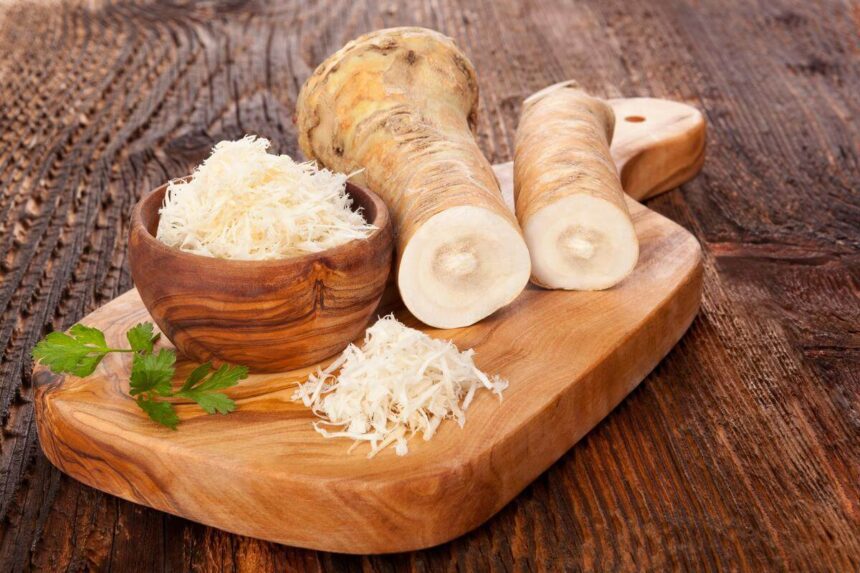Cats are known for their curious nature, and they often show interest in various types of human food. As responsible cat owners, it is essential to understand which foods are safe for our feline companions and which can be potentially harmful. One particular food that raises questions among cat owners is horseradish. In this article, we will explore whether cats can eat horseradish, its potential benefits or risks, and provide comprehensive guidance on feline nutrition.
What Is Horseradish?
Horseradish (Armoracia rusticana) is a plant commonly used as a condiment due to its pungent flavor. It belongs to the Brassicaceae family and is related to mustard, cabbage, and broccoli. The root of the horseradish plant is typically grated or ground to produce a spicy sauce or added to dishes for flavor.
Horseradish contains various compounds, including allyl isothiocyanate, which gives it its distinct taste and aroma. These compounds have antimicrobial properties and are believed to possess certain health benefits for humans, such as aiding digestion, boosting the immune system, and acting as an expectorant.
Can Cats Eat Horseradish?
While horseradish may have potential benefits for humans, it is generally not recommended for cats. Cats have a highly sensitive digestive system that is not designed to handle many of the foods humans consume. When it comes to horseradish, there are several reasons why it should be kept away from feline consumption:
Digestive Upset
Horseradish is known to irritate the digestive system in cats. The spicy nature of horseradish can lead to stomach discomfort, vomiting, diarrhea, or other gastrointestinal issues.
Toxicity
Horseradish contains compounds that can be toxic to cats, such as isothiocyanates. In large enough quantities, these compounds can potentially cause symptoms like gastrointestinal distress, respiratory problems, drooling, and even organ damage.
Allergic Reactions
Cats, like humans, can have allergies to certain foods. Introducing horseradish can trigger allergic reactions in cats, leading to symptoms such as itching, swelling, difficulty breathing, or even anaphylaxis.
Potential Choking Hazard
The texture of grated horseradish can be problematic for cats. The fibers can get stuck in their throat or cause choking, which is a serious medical emergency.
Given these risks, it is best to err on the side of caution and avoid feeding horseradish to your cat.
Safe Alternatives for Cats
If you want to treat your cat to something special or provide them with additional nutrients, there are safe alternatives available that can satisfy their cravings without posing any risks:
Commercial Cat Treats
Many cat food brands offer a variety of treats specially formulated for cats. These treats are designed to meet their nutritional needs and come in various flavors to provide a delightful snack.
Cooked Meat
Cats thrive on animal-based proteins, so offering small portions of cooked lean meats like chicken or turkey can be a safe and enjoyable treat. However, avoid seasoning the meat with any spices, as they can be harmful to cats.
Catnip
If you’re looking for a safe and stimulating treat, consider using catnip. Catnip is a herb that belongs to the mint family and can have a euphoric effect on cats, providing them with sensory enrichment.
Consulting a Veterinarian
If you have any doubts or concerns about your cat’s diet or introducing new foods, it is always best to consult with a veterinarian. They can provide expert guidance based on your cat’s specific needs, health conditions, and dietary restrictions.
FAQ’s
Can a small amount of horseradish be given to cats without any harm?
It is generally not recommended to give any amount of horseradish to cats. Even small amounts can cause digestive upset, irritation, and potential toxicity in cats.
What are the symptoms of horseradish poisoning in cats?
If a cat consumes horseradish or its compounds in toxic amounts, symptoms may include gastrointestinal distress (vomiting, diarrhea), respiratory problems, drooling, and potential organ damage. It is important to seek veterinary attention if you suspect your cat has ingested horseradish or any toxic substance.
Are there any health benefits of horseradish for cats?
Horseradish does not offer any significant health benefits to cats. Cats have specific dietary requirements that are best met through a balanced, high-quality cat food formulated for their needs.
Can cats be allergic to horseradish?
Yes, cats, like humans, can have allergies to certain foods. Horseradish is known to be a common allergen, and introducing it to cats can potentially trigger allergic reactions, including itching, swelling, difficulty breathing, or anaphylaxis.
What should I do if my cat accidentally ingests horseradish?
If you suspect your cat has ingested horseradish or any toxic substance, it is important to contact your veterinarian immediately. They can provide guidance on the best course of action and advise whether your cat needs medical attention or observation at home.
Remember, when it comes to your cat’s diet, it’s always best to prioritize their health and consult a veterinarian for professional advice tailored to your cat’s specific needs.
Can cats eat horseradish sauce or flavored foods that contain horseradish?
It is best to avoid feeding cats any food that contains horseradish, including horseradish sauce or flavored foods. The compounds present in horseradish can still be harmful to cats, even in small amounts or when combined with other ingredients. It is safer to stick to cat-specific foods and treats that are formulated for their nutritional needs.
Are there any other spices or condiments that cats should avoid?
Cats have a delicate digestive system, and certain spices and condiments can be harmful to them. It is generally recommended to avoid giving cats foods seasoned with spices such as garlic, onions, chives, or excessive amounts of salt. These can cause digestive issues, anemia, or even toxicity in cats. Additionally, artificial sweeteners like xylitol should never be given to cats as they can be extremely toxic.
Can cats eat raw horseradish root or leaves?
Raw horseradish, including the root or leaves, should not be given to cats. Raw horseradish contains higher concentrations of potentially harmful compounds and can cause digestive upset, irritation, and other adverse reactions. It is best to keep all forms of horseradish away from cats.
What should I do if my cat accidentally consumes horseradish?
If you suspect that your cat has ingested horseradish, it is important to monitor them closely for any signs of distress, such as vomiting, diarrhea, or difficulty breathing. Contact your veterinarian immediately for guidance. They may ask you to bring your cat in for an examination or provide instructions on how to manage the situation based on your cat’s specific symptoms and health history.
Can cats develop a taste for spicy foods like horseradish?
Cats do not naturally have a taste for spicy foods like horseradish. Their taste buds are different from humans, and they do not possess the receptor for detecting capsaicin, the compound responsible for the “spicy” sensation. Cats are more attracted to the smell and taste of meat-based foods that align with their carnivorous nature.
Can I use horseradish as a deterrent to keep cats away from certain areas?
While horseradish has a strong smell that may deter some cats, it is not recommended to use it as a deterrent. The pungent odor can cause discomfort and potential respiratory issues for cats. It is better to explore alternative cat-safe methods, such as placing physical barriers or using cat-friendly repellents, to keep cats away from specific areas.
Conclusion
While cats are known for their curiosity and willingness to explore different foods, it is crucial to prioritize their health and well-being. When it comes to horseradish, it is best to avoid feeding it to your feline companion due to the potential risks it poses, including digestive upset, toxicity, and allergic reactions. Stick to a balanced, high-quality cat food that meets their nutritional needs and consult your veterinarian for any dietary concerns. By providing a safe and appropriate diet, you can ensure that your cat leads a healthy and fulfilling life.



